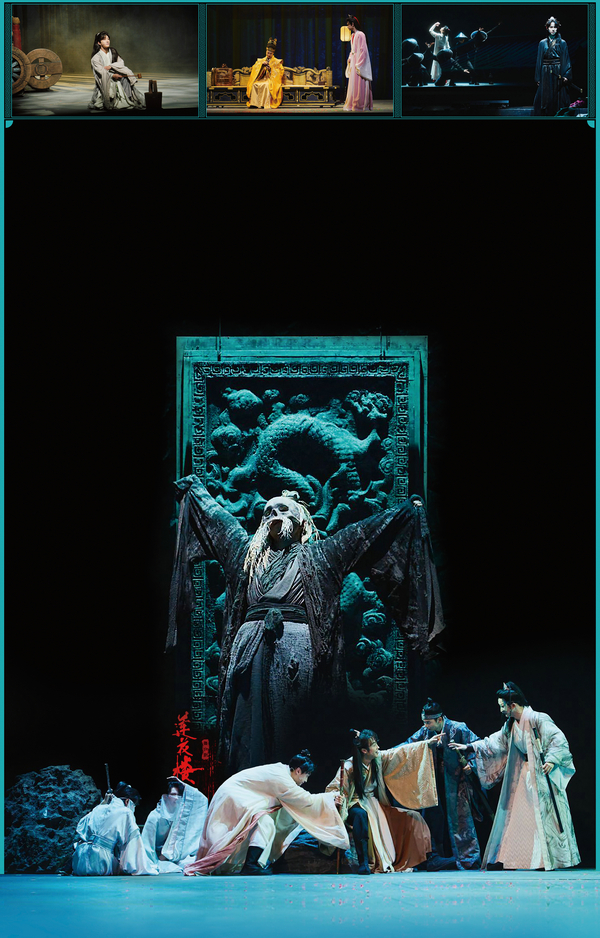

From page to screen, and now to the stage, an epic story of martial arts and mystery comes to life in a whole new dimension.
From Dec 6 to 7, the widely acclaimed play Mysterious Lotus Casebook will be presented at the CDHT CPAA Grand Theater in Chengdu, Sichuan province. Following its successful debut on Oct 25 in Hangzhou, Zhejiang province, the play has continued to captivate audiences in Xi'an, Shaanxi province, this past weekend.
Last year, the TV series of the same name won the hearts of audiences both in China and overseas, with each episode averaging over 79 million views by July 2024.
Adapted from Tengping's 2019 wuxia (martial arts and chivalry) novel, the series was produced by iQIYI, a leading Chinese video platform, and H&R Century Pictures. It starred popular actors including Cheng Yi, Zeng Shunxi, and Xiao Shunyao.
The narrative centers on Li Lianhua, the protagonist, a seemingly ordinary doctor with a mysterious past. Formerly known as Li Xiangyi, he was once a martial arts master who disappeared after a duel 10 years ago. Together with his companions Fang Duobing and Di Feisheng, Li embarks on a journey to uncover the truth about his past while solving enigmatic cases.
Actor Cao Enqi, 29, who portrays Li in the play, describes the character as "an unconventional protagonist", a key factor in the popularity of the franchise.
"Unlike typical protagonists who grow stronger in martial arts, Li starts at his peak and evolves through introspection and self-reconciliation," Cao explained.
Story evolution
Director Zhang Xiao, 32, highlights both the similarities and differences between the TV drama and the play.
He believes that fans of both formats share a deep passion for traditional Chinese culture and artistry. While TV series can reach a broader audience, Zhang emphasizes the unique charm of live theater.
He envisions a mutually beneficial relationship between the two art forms. "Theatergoers may become fans of the TV series, and vice versa, as the stage adaptation offers a fresh perspective on their beloved story," he said.
Xiao Ke, the producer of the play, added that a theatrical version could help extend the life of this popular franchise because she believes that a compelling story, when presented through various art forms, can offer diverse perspectives.
"Our goal at iQIYI has always been to showcase Chinese stories," said Xiao. "The novel explores the world of wuxia, an integral part of Chinese culture, while also weaving in elements of mystery, suspense, and comedy."
While the TV series featured numerous cases, the play focuses on a select few narratives to illuminate different facets of the character Li Lianhua.
For example, Zhang chose the Cailian Villa story from the TV series and the Longwang Coffin tale from the original novel to portray the complexity of Li's personality.
"The Cailian Villa case reveals Li's compassionate and tender side, while the Longwang Coffin case highlights his proud and somewhat arrogant nature," Zhang explained. "Much like the Marvel series, even if you're familiar with Iron Man and Thor, each Avengers film presents a fresh story. We aim to offer something new to TV audiences."
As for the performances, the play marks Cao's theatrical debut. He shared that acting on stage is very different from acting in front of a camera, as his gestures and delivery of lines need to be more expressive and adapted to the theatrical style.
There have also been adjustments in the costume design. For example, in the Longwang Coffin chapter, Zhang and his team added extra folds and patterns, such as tie-dye, to the costumes to better reflect the characters' personalities and situations. While such designs might appear distorted on TV, they stand out dramatically on stage.
"Costumes in theater are specially designed so that certain elements — whether it's a color representing a character's personality or the details and patterns — are visible to even those sitting in the last row," Zhang noted.
Timeless appeal
Despite its fictional wuxia setting in ancient China, which may seem distant or irrelevant to modern life, Mysterious Lotus Casebook has resonated with young audiences both domestically and globally.
"Many virtues, such as keeping promises and showing resilience, often portrayed in wuxia stories like ours, have been valued by the Chinese people throughout history," Zhang explained. "The pursuit of these virtues and the longing for such stories are deeply ingrained in our heritage."
He believes the series' global popularity is rooted in its depiction of distinctive Chinese culture. "The ambiance of bamboo forests, martial arts, and chivalry embodies the essence of our traditions, captivating foreign audiences with its unique charm," he said.
Cao also sees the franchise's lasting appeal as something that transcends time and cultural boundaries, adding that the story of Li could provide valuable insight for youth in China and around the world.
He explained that many young people today are seeking ways to make peace with themselves, and one lesson they can learn from Li is the importance of letting go.
"In today's fast-paced and stressful society, we're all constantly chasing something," he said. "Li was once obsessed with becoming the best in martial arts, among other desires, and later realized that none of those pursuits were truly important. Letting go requires more determination and courage than continuing to chase."
lixinran@i21st.cn